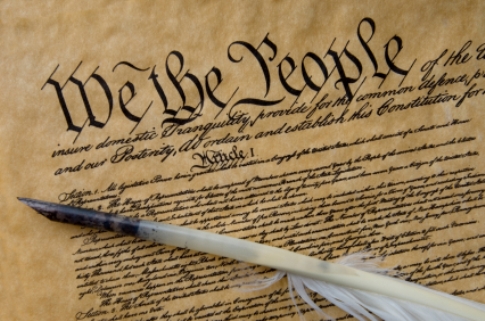Originalism is a legal theory of interpretation. It is a viewpoint when seeking guidance from legal texts such as the Constitution. Originalists believe that the constitutional text ought to be seen in light of the application of that text at the time that it became law.
Let’s unpack that for a moment. If a person with this view regarding legal standards in whatever arena (such as interpreting rights enumerated in the Constitution) can only interpret those rights based on the circumstances of the world at the time written.
I have issues with that for a number of reasons not the least of which is because I believe that most authors of texts of import are hoping for something that will translate to future generations in some meaningful way. In many cases, they are trying to articulate core truths or standards, not traffic laws for current modes of transportation. That is, after all, why we have parables and fables—to give us methods of seeing core standards, not recipes for how to make lye soap in the 16th century. In the strictest sense, originalism is interpreting something written in, say the 1700s, using only the circumstances that existed in the 1700s and nothing else.
Does that sound right to you? If we look at the framers of Constitution itself, we find these factors. The average age was 43, they were all white males, most were wealthy but not all of them inherited their wealth. Thirty-two were lawyers, two were college presidents, five were farmers, eight were merchants, and three were doctors. Nearly half enslaved captives from another continent.
Women did not get the vote until August 18, 1920 – granted by the 19th Amendment passed by congress on June 4, 1919, and ratified by the states on August 18, 1920.
Blacks were counted as 3/5 of a free individual for the allocation of seats for representatives in Congress. Their voting history is much more convoluted. The 14th Amendment passed by congress in 1866 and ratified in 1868 granted citizenship to all persons born or naturalized in the US including former slaves. The 15th Amendment (1870) stated that voting rights could not be denied or abridged by the US or any state on account of race, color, or previous condition of servitude. And for a time that worked—until it didn’t. Breeches of the intent were not fixed until the Voting Rights Act of 1965—an Act being eroded today.
In the 1700s, we did not have electronics, flight, trains, cars, power plants, the internet, global trade, space travel, social networks, or thousands of other advancements. We have worked through many challenges to continue to remain a stable republic throughout those changes with varying degrees of success. However, there is nothing in the Constitution that was intended to monitor and support today’s issues as they applied to a world of carriages and horses and the ownership of human persons.
Even the concept of insurance was different. Ben Franklin saw insurance as an organized effort to pool resources in order that those who suffered loss would have the means to restore themselves. This included providing a standard of what was appropriate and what was not. For instance, how to transport burning coals within the home, and how chimney sweeps should be licensed and held liable for a period of time after their inspection.
The point is this, the core thought process in the development of the constitution is presented in the preamble:
We the People of the United States, in Order to form a more perfect Union, establish Justice, ensure domestic Tranquility, provide for the common defense, promote the general Welfare, and secure the Blessings of Liberty to ourselves and our Posterity, do ordain and establish this Constitution for the United States of America.

Let’s see: Establish Justice, Ensure domestic tranquility, Common Defense, General welfare, Liberty
The Bill of Rights, written by James Madison and modeled after the Virginia Bill of Rights were written to put specific prohibitions on government power
They are as follows:
- Congress shall make no law respecting an establishment of religion, or prohibiting the free exercise thereof; or abridging the freedom of speech, or of the press; or the right of the people peaceably to assemble, and to petition the government for a redress of grievances.
- A well-regulated militia, being necessary to the security of a free state, the right of the people to keep and bear arms, shall not be infringed.
- No soldier shall, in time of peace be quartered in any house, without the consent of the owner, nor in time of war, but in a manner to be prescribed by law.
- The right of the people to be secure in their persons, houses, papers, and effects, against unreasonable searches and seizures, shall not be violated, and no warrants shall issue, but upon probable cause, supported by oath or affirmation, and particularly describing the place to be searched, and the persons or things to be seized.
- No person shall be held to answer for a capital, or otherwise infamous crime, unless on a presentment or indictment of a grand jury, except in cases arising in the land or naval forces, or in the militia, when in actual service in time of war or public danger; nor shall any person be subject for the same offense to be twice put in jeopardy of life or limb; nor shall be compelled in any criminal case to be a witness against himself, nor be deprived of life, liberty, or property, without due process of law; nor shall private property be taken for public use, without just compensation.
- In all criminal prosecutions, the accused shall enjoy the right to a speedy and public trial, by an impartial jury of the state and district wherein the crime shall have been committed, which district shall have been previously ascertained by law, and to be informed of the nature and cause of the accusation; to be confronted with the witnesses against him; to have compulsory process for obtaining witnesses in his favor, and to have the assistance of counsel for his defense.
- In suits at common law, where the value in controversy shall exceed twenty dollars, the right of trial by jury shall be preserved, and no fact tried by a jury, shall be otherwise reexamined in any court of the United States, than according to the rules of the common law.
- Excessive bail shall not be required, nor excessive fines imposed, nor cruel and unusual punishments inflicted.
- The enumeration in the Constitution, of certain rights, shall not be construed to deny or disparage others retained by the people.
- The powers not delegated to the United States by the Constitution, nor prohibited by it to the states, are reserved to the states respectively, or to the people.
What an originalist does is look at the Constitution and determine that if the item or point of law under review did not exist at the time of the Constitution, there is no Constitutional right granting protection. The consequences of this are similar to the SCOTUS ruling indicating that states cannot restrict carry laws to persons with identifiable needs for protection. Meaning, in their opinion, you can take a gun anywhere you like with some allowance for undefined “sensitive areas.” Or, because the Constitution is silent about health care autonomy, it doesn’t exist.
I wonder though, if parents could sue a school board under the 4th Amendment if overzealous coaches start checking genitals before allowing children to join sports teams (secure in their person). Or if we can skip the whole “states rights” dust cloud and sue for the privacy of our health care choices under the 10th (reserved to the people).
At issue is some recent decisions is the 14th Amendment which reads like this:
All persons born or naturalized in the United States and subject to the jurisdiction thereof, are citizens of the United States and of the State wherein they reside. No State shall make or enforce any law which shall abridge the privileges or immunities of citizens of the United States; nor shall any State deprive any person of life, liberty, or property, without due process of law; nor deny to any person within its jurisdiction the equal protection of the laws. (June 13, 1866; ratified July 9,1868)
A lot of case law had been built on this Amendment including the right of every citizen to have equal access and protection under the law (still working on that—really) and to not have their liberty or property violated without due process (yeah, still working on that one, too). The 14th Amendment was drafted primarily to protect freed persons enslaved in America and to grant equal protection under the Constitution (yeah, well, we are supposed to be working on it).
Some landmark decisions made based on the 14th Amendment are as follows:
Plessy v. Ferguson (5/18/1896) The court ruled against the plaintiff establishing the “separate but equal” concept that a black person could be kept from a facility used by whites (in this case a train) if an equal and separate alternative was available.
Brown v Board of Education (5/17/1954) The court ruled that Plessy v. Ferguson was flawed and that separate is inherently unequal. Segregation was a violation of the Equal Protection Clause.
Griswold v. Connecticut (6/7/1965) The court ruled that a couple could seek counseling regarding birth control under the “right to privacy” clause in the 14th Amendment. Justice Douglas wrote that, although not explicit, the Bill of Rights contained the fundamental “right to privacy,” a concept at the core of due process. This is also the concept used to decide Roe v. Wade (1/22/1973) which was the decision that citizens had the ultimate right to privacy in the choice to have an abortion.
Loving v. Virginia (6/12/1967) This was a mixed-race marriage case where the couple went to Washing DC to get married (where it was legal) and were arrested when they returned to their home state. After exhausting their appeals in Virginia where the court agreed to suspend their sentence of one year in jail for 25 years if they left the state, they appealed to the Supreme Court. SCOTUS unanimously struct down the conviction based on the Equal Protection Clause of the 14th Amendment.
There you have a history of some 100 years of interpreting the fundamental rights expressed within the 14th Amendment as they applied to a changing social and cultural society. That is what a Constitutional scholar does, look at the structure of the Constitution and determine how the core legal issues should be applied in modern life. Freedom of speech a couple centuries ago allowed people to print pamphlets, hold rallies, and say what they wished, understanding that not everyone would be pleased with what they said—but the government could not infringe the right. The clause does not protect you from the consequences of what you say. Now with the internet, something that used to have the Secret Service knocking at your door (threatening the president or other ranking official) is an afternoon pastime. Hell, even high ranking officials want to play.
To see which method of interpretation was intended by the authors, let’s look at some recorded thoughts of Thomas Jefferson. A white, wealthy, well-educated, enslaver of humans.
“I am not an advocate for frequent changes in laws and constitutions. But laws and institutions must go hand in hand with the progress of the human mind. As that becomes more developed, more enlightened, as new discoveries are made. New truths discovered and manners and opinions change. With the change of circumstances, institutions must advance also to keep pace with the times. We might as well require a man to wear still the coat which fitted him when a boy as civilized society to remain ever under the regimen of their barbarous ancestors.”
Our founding fathers, with all their inherent faults, wished to create a living, breathing document that could be seen as advice for the future. A flexible set of core values to be applied as situations changed, people matured, and society learned a broader concept of what it meant to live together in some form of harmony.
I think we must fight with all our strength to prevent those with narrow vision from wrapping us in the straightjacket of the limited knowledge of our forbearers; and begin to build the free and equal society they may have seen differently, but believed in with every fiber of their being.


No Comments